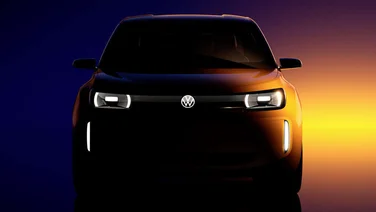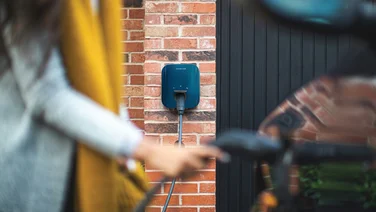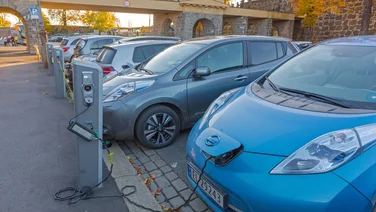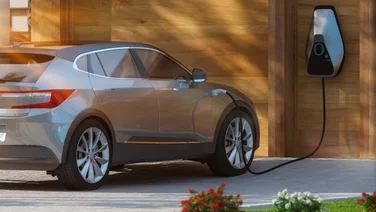- What’s on this page?
- How does wireless electric vehicle charging work?
- How to charge your electric vehicle wirelessly
- How fast is wireless electric vehicle charging?
- How much does wireless electric vehicle charging cost?
- Will wireless electric vehicle charging become more popular in the UK?
- Next steps
✔ Wireless EV charging happens through a process called ‘inductive charging’
✔ Wireless charging can replenish a bus’s battery in around 10 minutes
✔ It currently costs 22,483 to add 4–6 battery pads to a bus
An electric car charging point costs around £1,000, and can save you thousands of pounds. And with technology in the green energy industry is evolving rapidly – particularly in the wireless EV chargers have available for a few years.
Just as many smartphones can now be charged by simply placing them on a pad, wireless EV charging can work by simply driving over an underground charging station.
Intrigued about the science behind this new bit of kit, how much it costs, and whether it’ll become as popular as EVs themselves? Luckily for you, we’ve got everything you need to know about wireless EV charging below.
But if you to stick with cord EV charging, and we can help you find the right one for your home. All you have to do is pop a few details in our quote comparison tool, and let us do the rest. We’ll put you in touch with our professional installers, who will contact you with their best prices.
Get free EV charging point quotes
Answer a few quick questions, and our trusted installers will send you bespoke EV charging point quotes – for free.

What’s on this page?
How does wireless electric vehicle charging work?
Wireless EV charging happens through a process called ‘inductive charging’, which works by transferring electricity from one magnetic coil in the charging pad to another one fitted to the car.
Both coils can be inches apart but they need to align, which means drivers have to park directly over the charging pad in order for the process to begin.
Sounds pretty futuristic, right? Well, some companies are already rolling it out in the UK. Charging companies Char.gy, Qualcomm, and Sprint Power have all developed their own charging pads and are in the process of trialling them in public. Some larger companies, including BMW, have also started to offer static wireless charging systems.
The county of Nottinghamshire is even taking part in a trial, which will analyse nine electric taxis using wireless charging, as part of the WiCET project – a £4.47 million initiative which will hopefully demonstrate the successes of wireless charging for electric vehicles.
Key benefits of wireless charging
- No charging cables – This can help eliminate street clutter
- Easy to do – There’s no need for the driver to leave their seat, as you can simply drive over the charging pad. This means taxis and buses can wait for passengers in the taxi rank and charge at the same time
- Zero emissions – The ease of wireless charging encourages people to invest in electric vehicles, which helps improve local air quality whilst reducing noise pollution and carbon emissions
- Potential for more innovation – Many people have suggested that, in time, we could line our roads and highways with wireless charging pads. This means we could have a consistent and never-ending charge while driving

Is this what the future of driving could look like?
How to charge your electric vehicle wirelessly
It really couldn’t be easier to charge your electric vehicle wirelessly. All you need to do is park on top of the charging pad, and let it do its thing.
The two coils will then start transferring electricity, and you can go about your day.

How fast is wireless electric vehicle charging?
Since wireless charging is still relatively new – mostly being trialled on taxis and buses – there’s limited information on how fast it works in a domestic setting.
However, wireless charging can replenish a bus’s battery in around 10 minutes, allowing it to keep going without needing a full charge for 16 or 17 hours.
As with any new technology, there’s a lot of mixed opinions on whether wireless EV charging is as good as standard EV charging.
However, in terms of efficiency, wireless charging is currently in the range of 90% to 93%. This means it does as good a job of transferring electricity from the charger to a car’s battery as standard charging does – and since no charging rate is 100% yet, we’d say that’s pretty good.
How much does wireless electric vehicle charging cost?
Again, since wireless charging is still relatively new, it’s more common for it to be introduced to taxi and bus services rather than domestic vehicles.
“Before you get to electric cars, there are an awful lot of vehicles, such as buses and taxis and vans, that have to go electric,” Andrew Daga, chief executive of Momentum Dynamic, told The Financial Times.
Currently, it costs $30,000 (£22,483) to add four to six pads to a bus, but the company Momentum Dynamic is aiming to cut that to less than $1,000 (£749) once it is producing at scale.
This means that wireless pads could cost between $5,000-$7,500 (£3,747-£5,246) for an individual pad.
In comparison, in our ranking of the best home EV chargers, costs were between £695-£1,395.
Will wireless electric vehicle charging become more popular in the UK?
Considering how many benefits there are to wireless charging, there’s definitely potential for this tech to become more common across the UK.
However, rather than gaining popularity for domestic use, it’s probably going to take off for taxis and buses. Without having to park up to charge these vehicles for an hour or so, bus and taxi drivers will be able to charge vehicles faster, whilst waiting for passengers.
Whether wireless EV charging will take off for domestic use is another question. One thing’s for sure – the price needs to reduce massively before people begin to consider it over cord-charging systems.
Despite EVs getting more popular across the UK, only 55% of people would have an EV if it were free, according to our National Home Energy Survey.
Next steps
There’s no denying that wireless charging opens a lot of doors for EV innovation: buses can charge whilst passengers hop aboard, efficiency levels match standard charging methods, and we could see wireless charging roads in the future.
However, right now, this isn’t likely to help domestic users that much – the price is much higher, and it offers only a few extra benefits.
Thinking of getting a standard cord-charging station for your home? We can help you with that.
If you want to join the growing number of Brits getting home charging stations, pop your details in this quote tool to hear from our expert installers, and find out how much it would cost you.






